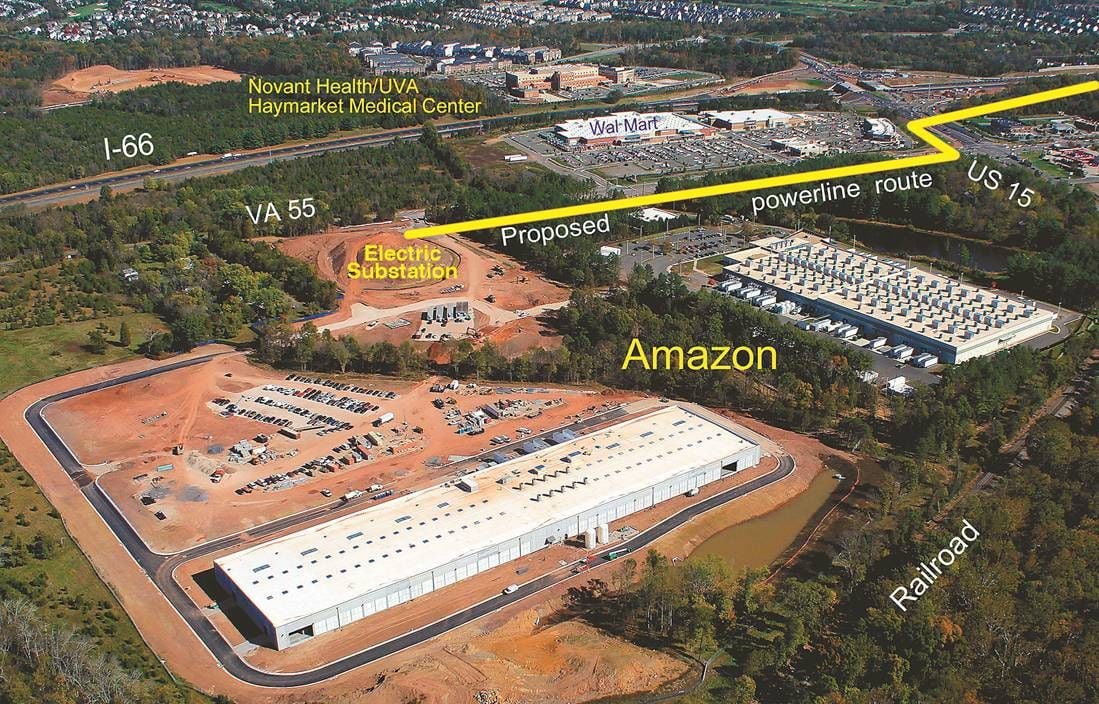By Alex Koma, akoma@insidenova.com, April 12, 2017

The route in yellow had been preferred by the county, but rejected by state regulators. An alternative proposal is expected to focus on access from the railroad tracks nearby.
The State Corporation Commission gave the project a green light last week, clearing the way for Dominion to proceed with its effort to run a 230 kilovolt line to help power a data center in Haymarket owned by an Amazon subsidiary, and build a new substation in the area as well.
County lawmakers and environmental advocates were pressing for the commission to approve a design that would have buried several miles of the power line along I-66, instead of stringing 100-foot-tall overhead lines through the area, claiming that option would have the least impact on nearby neighborhoods. But the regulators felt the design was both too expensive and more difficult to construct, and recommended two other routes instead: one along Carver Road, the other alongside a set of railroad tracks owned by Norfolk-Southern.
Dominion will now have 60 days to secure the county’s approval for the railroad option, after supervisors placed a conservation easement on land along the tracks while trying to fight this design option. Should the power company fail to get an agreement on that front, the SCC recommends pursuing the Carver route in its place.
“The SCC concluded that both of these routes will reasonably minimize adverse impacts on the scenic assets, historic districts and the environment of the area concerned,” the commission wrote in a statement. Chuck Penn, a Dominion spokesman, said the company is still reviewing the order.
But Elena Schlossberg, executive director of the Coalition to Protect Prince William County, says “any route that goes through or near neighborhoods in environmentally sensitive areas is simply unacceptable” to the community. Like the county, her group has been fighting for months to push Dominion to adopt the I-66 option, and she believes the SCC commissioners “abdicated their responsibility” on the issue by pushing the final decision to the county.
“I’m astounded that they left the choice to the county,” Schlossberg said. “It’s a real ‘Sophie’s Choice.’”
Schlossberg feels the I-66 hybrid option was “in totality, the least offensive” route for the company to pursue in preserving the area’s natural beauty and historic battlefields.
But the commissioners wrote that, “while the railroad route and Carver Road route affect more acreage of wetlands, the I-66 hybrid route would be more intrusive to wetlands.”
“Specifically, the I-66 hybrid route would require trenching and soil excavation within the wetlands to construct the concrete duct banks necessary to underground the line,” the regulators wrote. “According to [Dominion’s] environmental consultant, this trenching and soil excavation could disrupt wetland hydrology, disturb seed banks and temporarily change wetland function.”
The commissioners also worried that the I-66 hybrid option would prove to be considerably more expensive than the others — Dominion estimates that it would cost at least $167 million, compared to $55 million and $62 million for the Carver and railroad options, respectively. They believe the new data center will generate hefty tax revenues for the county, and that the new infrastructure will end up making service more reliable for other customers in the area too.
But Lawson notes that the SCC’s own staff recommended last year that the data center’s main client help bear some of the cost of the project. Amazon has never officially acknowledged that it plans to use the data center for its online retail business, but Schlossberg and a group of local lawmakers have long charged that the successful company is behind the project and deserves to pay its fair share.
“The SCC does not want to burden the second richest person in the world, Mr. Jeff Bezos [Amazon’s CEO], with having to pay to construct the power lines necessitated by his decision to put a data center six miles outside of an industrial area,” Del. Bob Marshall, R-13th District, wrote in a statement. “There
Schlossberg blasts the decision as “the worst kind of corporate subsidy,” and is even confused about what authority supervisors even have to make this kind of decision about letting the railroad option move forward.
“Who is the SCC to give a timeline demanding something that’s not even within the statutory power of the county?” Schlossberg said.
Lawson says the board is similarly puzzled, and will be consulting with the county attorney about how to proceed. But she does note that the county has full permitting authority over the new substation attached to the permit, and could exercise a good bit of its influence there.
“Dominion is trying to get this board to back down on the commitment that we made to protect these neighborhoods,” Republican At-Large Chairman Corey Stewart said during the board’s April 11 meeting. “But we are never going to back down on that easement, and if it comes to it, and the board needs to protect these communities by pulling our support for that data center project, that’s unfortunate, but so be it.”
Lawson also noted that she’s heard plenty of people “raising the question of the constitutionality” of the SCC’s order, so a legal challenge may be in the offing.
But no matter how people in Prince William choose to fight the SCC’s decision, Lawson feels confident that this debate is a long way from a resolution.
“We’re just going to maintain our position and not let up,” Lawson said. “We have no reason to stop fighting. It’s way too early for that.”
